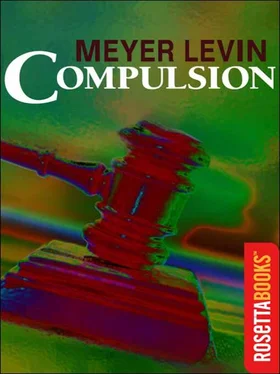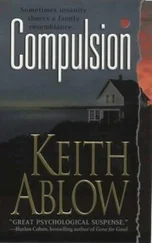Now Horn took up this argument. “Insanity is a defence,” he insisted, “the same as an alibi. Have we got to a point of the law here where we can enter a plea of guilty before the court in order to avoid a jury, and then treat that plea as a plea of not guilty, and put in a defence?”
The judge made a movement, as though brushing away a fly. Horn kept on. “I insist, if Your Honour please, that we proceed without hearing any evidence tending to show that these men are insane. If not, everything you do from now on is of no effect under the law.”
There was a gasp from the courtroom at his audacity. Dr. McNarry, who had been staring at Horn with a professional half-smile, now turned his gaze upon Judge Matthewson.
“From the moment you hear evidence on insanity, this becomes a mock trial!” Horn shrieked. At last, the judge cut in. Did the State’s Attorney have any authorities?
Several lawyers responded simultaneously. Meanwhile, as Judd and Artie listened intently, the judge leaned forward, explaining his own view. It was actually his duty to find out if the boys might be insane, in order to protect their rights – to a jury trial! “I have a right to know whether these boys are competent to plead guilty or not guilty.”
The judge seemed determined to give each side a point, for he went on to remark, “There are different forms of insanity. Medically-”
“Not under the law!” Horn cried.
Patiently, as one going back to fundamentals, Judge Matthewson asked Horn, “Then is there no mitigation in a murder case at all?”
“Insanity is not a mitigating thing. It exists or does not exist.”
Wilk ambled to the bench, as a man puzzled. “And has the degree of responsibility nothing to do with it?”
“Degree!” Horn snapped. “Insanity is a total defence, the same as self-defence, the same as an alibi.”
“But if a medical condition-” Edgar Feldscher began.
Padua interrupted. “The law on the issue of an insanity defence-”
“We claim-” began Wilk.
“One moment, Mr. Wilk!” And he put his question to the judge. “If it is conceded that insanity is not a defence, have they any right to introduce any evidence of insanity?”
“No, we’re not-” Feldscher shouted.
“No evidence of insanity!” Wilk echoed, while Dr. McNarry studied them all with interest.
“Then have you any right to introduce evidence as to the mental condition of these men?” Padua demanded.
“Certainly!” they cried in unison.
“Evidence intended to show that they are not responsible, or should not be held to the degree of responsibility that other people should be?”
“Certainly,” Wilk demonstratively resumed his seat.
“But that is insanity called by another name!”
“You can call it green cheese if you like!” Ferdinand Feldscher sneered.
“Wait, wait! Don’t get excited!” The judge leaned in.
Dr. McNarry permitted himself a chortle. Judd grinned. Artie looked worried, as if to remind us all that his life was at stake in this dispute.
The case seemed to hang in balance. Turning blandly toward Dr. McNarry, the judge said, “I don’t know what Dr. McNarry or whatever his name is, is going to testify.” He beamed upon Horn. “Nobody has said he is going to testify as to their sanity, except the State.”
It was sophistry. We all had the report of the alienists in our hands. Did not the report on each boy conclude with the statement that he was mentally affected? From a legal point of view, Horn seemed right. But the real trouble was that the law itself in its definition of insanity was antiquated.
There in that broiling courtroom in Chicago the inadequacy of the definition was being made clear; there in those days of wrangling the law itself was being tested. If it did nothing else, if the life or death of Judd and Artie was of little significance, their case at least served to focus the world’s attention on the inadequacy of our laws in the face of our new knowledge of the human personality and mind.
The argument climbed. The lawyers brought in rulings from Nebraska, precedents from Alabama, statutes from Colorado. Word of the battle had seeped down to the street, and the pressure at the door increased. As in most arguments, the issue was only a definition of a word. Insanity. The word was like a push button for a jury. The defence tried to shade it to “an affected mind”.
“There is no need in citing the law,” Judge Matthewson said. “If there is any mental disease, it is insanity.”
There was a sudden silence. The prosecution seemed to have won. Judd, in panic, turned to Jonathan Wilk.
Wilk arose again and stepped to the bench. “Do you mean to say that the court will not consider the mental condition on the question of mitigation? When the mental condition does not rise to a defence?”
His question hung in the air. Mitigation, he repeated. What entered into mitigation? Didn’t one consider the conditions that led to a crime? The background of the criminal, the forces that moulded his character? The pressures upon him, the extent of his responsibility?
And as he spoke, the courtroom was being gradually drawn back from the definition of a word to deeper questions. What was free choice of action? What was free will? And, unsaid, one could hear Wilk’s lifelong rumination, his gentle pessimism, his insistence on some form of mechanistic determinism, his claim that there was no free will. Yet even if some freedom of will did exist, “Suppose the mental condition seriously interferes with their free will and understanding, don’t you think the court has a right to listen to that, in mitigation?”
It was the deeper kind of plea, for which we had waited from Wilk, the plea for compassion, yet delicately balanced, because if you carried it too far you would be saying what you really meant, that no one was responsible for any crime.
And Padua, lowering his voice so that it was as solemn as Wilk’s, devilishly suggested, “If you had a mental condition of that kind, it would be your duty to take full advantage of it before a jury.”
A grudging gasp went through the courtroom, at the young attorney’s cleverness in puncturing the grand champion’s spell.
Wilk was momentarily taken aback. Ferdinand Feldscher stepped in, to quote authorities again, and at times four or all six of the attorneys argued earnestly, with the judge intently taking part.
But gradually voices rose. “We’re wasting hours!”
“Wasting a few hours doesn’t make any difference,” said the judge. “The lives of two men are at stake here, and the issue itself is important.”
The morning session was over. As the boys were led out, Judd remarked to Dr. McNarry, “Well, you nearly got a word in,” and Artie said, “They’ve got you stuck to that seat, Doc.” We all recorded their wit, the hostile papers adding that at two hundred and fifty dollars a day, the doctor had no reason to complain.
When the argument was resumed, it was Edgar Feldscher who attempted to clarify the issue. “Even the most expert alienist finds it difficult to put his finger on the border line between sanity and insanity.” Though experts found it hard to define insanity, Feldscher pointed out, “Yet the law is that a jury of twelve ordinary laymen, maybe half of whom got through high school, should, on listening to testimony, be able to judge whether a man is sane or insane!”
“But that’s the law!” Horn was right back at it. “An insanity issue goes before a jury.”
The mild Edgar Feldscher suddenly snapped, “Let me ask, when you were a judge on this bench, didn’t you, in a similar proceeding – in the Fitzgerald case – hear evidence of sanity on a plea of guilty, for attacking that poor five-year-old little girl?”
Читать дальше












